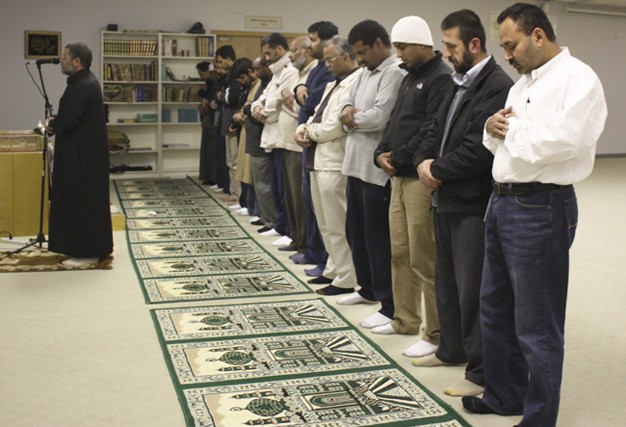Along with the rest of the country, Javed Sikander, Hyder Ali and Island resident Arsalan Bukhari were all relieved at the news of Osama bin Laden’s death.
They’re also hopeful that the death of Al-Qaeda’s leader will allow the United States to heal and move on from the attacks he ordered on Sept. 11, 2001. These attacks launched a decade-long war on terror by the United States in the Middle East.
While the American population as a whole has been greatly affected by these events, Sikander, Bukhari and Ali — as Muslim Americans — have experienced and witnessed firsthand just how much the terrorist’s plans changed this country.
The bin Laden effect
Ali, the president of the Muslim Association of Puget Sound in Redmond, said since Sept. 11, 2001, there has been increased scrutiny and questioning of Muslims and their patriotism. The Issaquah resident said personally, he has been singled out and questioned at airports and even just a few weeks ago when he traveled to Canada.
Even though he and many of his fellow Muslims have condemned bin Laden and Al-Qaeda’s actions, Ali said most Americans do not believe they are being sincere.
“That’s not the case,” Ali said. “For us, (bin Laden) does not represent what Islam is.”
Prayer service
Bukhari has also seen how life has changed for Muslims in this country. The Mercer Island resident is the executive director for the Washington chapter of the Council on American Islamic Relations (CAIR), a national civil rights group that works with Muslims all over the state on resolving cases ranging from harassment to hate crimes. The organization does this through advocacy and litigation. CAIR also works to educate Muslims on their rights and the political process as well as educate the community about Islam.
Bukhari said from 2000 to 2001, the number of hate crimes against Muslims quadrupled. Mosques were vandalized and individuals were attacked. Bukhari added that in some cases, victims were not even Muslim; from Sikhs to Latinos, they were attacked or discriminated against because they looked like they could be Muslim.
Bukhari, who was a college student 10 years ago, said people have the right to be offended and fearful, but it is irrational to direct those feelings toward a particular group of people.
“An attack on civilians is wrong,” he said.
Bukhari added that in the five years following Sept. 11, CAIR doubled its number of chapters nationwide as the need increased. There are now more than 30 CAIR chapters across the country.
From bad comes good
While Islam has received more attention in the past 10 years, Sikander said not all of it has been negative.
An eight-year Redmond resident, Sikander is the president of the Islamic Center of Redmond. He was in Dallas during the Sept. 11 attacks. He knew when they happened that Muslims would be facing significant challenges in the United States, and he and his fellow Muslims became more careful when they went to mosque, as there were the attacks Bukhari also mentioned.
But Sikander said he has seen a larger amount of outreach and support from the community. In his everyday life, he has seen more compassion and curiosity about Islam, which has helped him be more proactive in reaching out in return. He and Bukhari said mosques are open to the public, but because of Sept. 11 and the events that followed, has made them more driven to make this known.
“(Sept. 11 and the community outreach have) made me more open,” Sikander said.
Because Americans are curious by nature, Sikander was not surprised about other people’s interest in his religion as they heard more about it in the news. He said they just wanted to understand it better.
Bukhari said this outreach was a pattern they saw everywhere as neighbors of all backgrounds offered to help the Islamic community during the Sept. 11 aftermath. For example, at one point, the community surrounding a mosque in the Northgate neighborhood of Seattle kept an overnight vigil around the mosque in anticipation of possible attacks.
Bukhari, Sikander and Ali said with bin Laden’s death, they must keep working to build bridges in the community and educate people about Islam as the general Islamic population may be lumped together with bin Laden and his actions.
Cautiously hopeful
Bin Laden’s death has also sparked hope in the three men.
Sikander hopes the news has helped bring some closure to the victims of Sept. 11 and their families. He also hopes this is a step toward peace around the world.
Bukhari said for almost 10 years, the United States’ ability to work together with people of all backgrounds has been undermined by this one man, adding that bin Laden’s actions have cost too many lives. Bukhari hopes bin Laden’s death is also a blow to the morale among the network he created in Al-Qaeda. And with this blow, he hopes the war on terror will end.
“I hope our own men and women who are in Iraq and Afghanistan come home safely and soon,” Bukhari said.
Sikander said there has been significant progress against terrorism in the world.
Ali said he can’t predict what will happen now that bin Laden is dead, but he knows what he wants to happen.
“I hope it makes our country safer and that people recognize that people in every society claim to represent an ideology, a religion or a culture, and they don’t truly do that,” he said.
Samantha Pak is a reporter for the Redmond Reporter newspaper, a sister publication of the Mercer Island Reporter.


